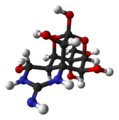User:Cmcderm/Maculotoxin
| This is not a Wikipedia article: It is an individual user's work-in-progress page, and may be incomplete and/or unreliable. For guidance on developing this draft, see Wikipedia:So you made a userspace draft. Find sources: Google (books · news · scholar · free images · WP refs) · FENS · JSTOR · TWL |
Maculotoxin new article content ...
Sources in nature
[edit]Maculotoxin (C11H17N3O8) is produced naturally in the Blue-ringed Octopus, in the Genus known as Hapalochlaena. The Blue Ringed Octopus lives from Australia to Japan in the Pacific Ocean. It secretes Maculotoxin through its saliva. Maculotoxin is the same chemically as Tetrodotoxin [1](C10-12H15-19O8-10N3), a toxin secreted by Pufferfish, a few salamanders, two types of shell fish, and a handful other animals.
-
Blue-ringed Octopus
Biochemistry
[edit]Maculotoxin binds to the sodium channels of the cell membrane (this is what allows sodium to pass through the cell membrane in and out of the cell). It binds to the TTXs (Tetrodotoxin)- Na+ sodium channel which affects the body’s nervous system.
-
Tetrodotoxin Structure
-
3-D Tetrodotoxin Structure
Poisoning
[edit]
- Toxicity
A ½ mg of Maculotoxin is enough to kill a human[2]. Bacteria found in the Blue Ringed octopus’s saliva secrets Maculotoxin. This bacteria was obtained from multiple specimens of Blue Ringed Octopus around the Phillipines and Japan area from 1985-1986. The bacteria was identified as Alteromonas, Bacillus, Pseudomonas, and Vibrio[3]. Blue Ringed Octopus was later examined and found to have Tetrodotoxin located in every part of its body, not just the salivary glands[4].
- Symptoms and treatment
After ingestion, people will feel numbness around the mouth. From there, the “pins and needles” feeling sets into the face and extremities of the body. At this point in time, headaches, stomach pains, gastric problems, and vomiting may occur. From here paralysis begins to set in. Respiratory and cardiac problems occur (the heart will not pump if the sodium channel is blocked). If Maculotoxin is ingested into the body at a high amount, the only treatment available to keep a human alive is CPR until the toxin has dissipated out of the body (this usually takes 24 hours). If treatment is not given, death usually occurs within four to six hours[5].
References
[edit]{{Flachsenberger, W., Mebs, D., Yotsu-Yamashita, M. (2007). Distribution of tetrodotoxin in the body of the blue-ringed octopus (Hapalochlaena maculosa). Toxicon, Volume 49 (Issue3), pages 410-412.
Arakawa, O., Hashimoto, K., Hwang, D.F., Noguchi, T., Saito, T., Shida, Y., Simidu, U., Tsukamoto, K. (1989). Tetrodotoxin-producing bacteria from the blue-ringed octopus Octopus maculosus. Marine Biology, Volume 100 (Issue 3) pages 327-332.
Fuhrman, F., Mosher, H. (1984). Occurrence and Origin of Tetrodotoxin. Seafood Toxins, Volume 262 (Chapter 28) pages 333-334.
Croft, J.A., and Howden, M.E.H. (1972). Chemistry of maculotoxin: A potent neurotoxin isolated from Hapalochlaena maculosa. Toxicon, Volume 10 (Issue 6) pages 645-651.
Gage, P., Moore, J., Westerfield, M. (1976). An Octopus Toxin, Maculotoxin, Selectively Blocks Sodium Current in Squid Axons. Journal of Physiology, Vollume 259 (Issue 2) pages 427-443.
• http://marinebio.org/species.asp?id=403 • http://www.underwateraustralasia.com/content/5192/blue_ringed_octopus.jpg=403 • http://en.wikipedia.org/wiki/Blue-ringed_octopus • http://en.wikipedia.org/wiki/Alkaloid • http://www.chm.bris.ac.uk/motm/ttx/ttx.htm • http://www.iupac.org/publications/pac/pdf/1964/pdf/0901x0049.pdf • http://en.wikipedia.org/wiki/Tetrodotoxin }}
--Cmcderm (talk) 18:44, 25 April 2011 (UTC)
- ^ http://en.wikipedia.org/wiki/Tetrodotoxin
- ^ http://www.chm.bris.ac.uk/motm/ttx/ttx.htm
- ^ Arakawa, O., Hashimoto, K., Hwang, D.F., Noguchi, T., Saito, T., Shida, Y., Simidu, U., Tsukamoto, K
- ^ Mari Yotsu-Yamashita, Dietrich Mebs and Wolfgang Flachsenberger
- ^ http://www.chm.bris.ac.uk/motm/ttx/ttx.htm




